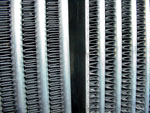|
jStStray Current Killer !!


| |
SStray current is the single
most worrying problem to have in a modern automotive cooling system,
that's both oe. or aftermarket. I liken it to cancer in our body! If
inhibitors are mixed in the same system, then life expectancy can be
measured in weeks as a worse case scenerio. We have seen a trade
customers Barina last five weeks & six days & when we investigated -
1.03 volts of stray current fuelled by a mix of three inhibitors
in seven months (no, the customer wouldn't pay for a proper system
flush) from supply of a new assembly, to it's return with one leak & two
weeps! The worst reading I,ve seen was another trade customers HX Holden
- 1.87 volts & the worst part of the story is that after more than a
days labour, the Auto Electrical workshop that got involved , gave the
car back in disgust at not finding the problem. |

N.B. This pic is of intercooler
cores, tubes are thicker, but fin variance shows up the same.
|
AARE is not immune to the stray
current problem either. Over the years, three of our customers cars have
had the problem & just recently, our own Shop truck (3L turbo
diesel Hi Lux) was inflicted with 0.37 volts (370mv) in the air/water
intercooler system we fitted. It is only in the intercooler, with
0.18mv showing in the radiator. This was the eighth system we fitted &
have fitted three since with no problems & the same components. I didn't
spend much time chasing the problem, instead deciding to see just how
long the intercooler & cooling radiator cores would last, for our own
future reference. 9 months & still counting.
|
| |
The above two paragraphs look doom &
gloom & if your car has an untraceable level of stray current above the
acceptable 0.05v (50 mv.) level, then it was. I say was, because we now
have a product in stock that can do the impossible. Our trucks
intercooler system now has 0.022v (22mv) current in it's system after 5
days with 250ml of
in the system. The manufacturers say to give it two weeks in the system,
so we'll see. Unfortunately, we will have to wait a while too see if the
product is perfect or not, I'm talking about if there will be any
chemical reaction with inhibitors used. We have Tectaloy anti
freeze/anti boil, in our system, but because the water temps
rarely go above 50 deg.c. it will have to be a long term test as heat
usually speeds most automotive chemical reactions. None of our cars
engine cooling systems are over the limit, so I'm still deciding
about a |
|